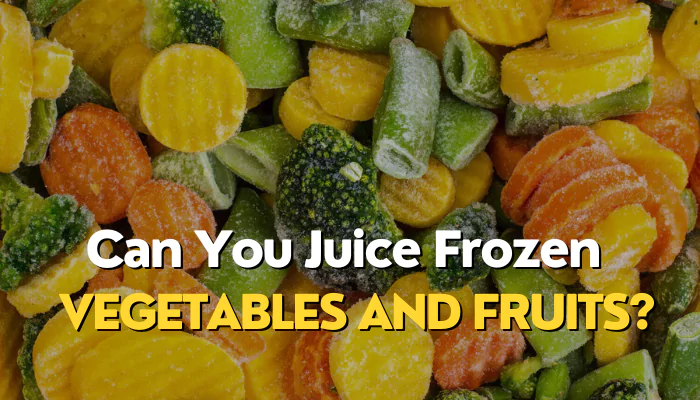Juicing has gained popularity as a method to add more fruits and vegetables to our diets, offering a quick and practical approach to receiving vital nutrients. Even while fresh produce is frequently the preferred option for juicing fans, frozen veggies have drawn interest as a potential substitute. In light of this, can you juice frozen vegetables?
This post will examine the viability, advantages, and potential pitfalls or considerations of juicing frozen veggies.
Also Read: What Vegetables Should Not Be Juiced
Can You Juice Frozen Vegetables And Fruits?

Fruits and vegetables from frozen can be juiced. The nutritional value and freshness of fruits and vegetables are regularly retained by freezing. Because it eliminates the necessity for washing, peeling, and chopping, frozen produce may be a sensible juice option. Juicing frozen fruits and vegetables can result in a hydrating and nutritious beverage. There are a few considerations when juicing frozen veggies. Before being juiced, the frozen fruits and vegetables must first defrost. After thawing, the produce may soften, which makes juice extraction easier.
Second, certain frozen fruits and vegetables may thaw and release more water than others, changing the juice’s consistency. To avoid this, you can alter the amount of liquid fed into the juicer or filter the juice to eliminate extra water. Last but not least, it is essential to remember that freezing may change the flavor and texture of several fruits and vegetables. Despite these factors, juicing frozen vegetables is still a practical way to make a nourishing and delicious juice.
Here is why you should freeze veggies:
Preservation of Nutritional Value
Freezing is one of the best methods to preserve the nutritional content of fruits and vegetables. Fresh produce contains essential vitamins, minerals, antioxidants, and other beneficial compounds contributing to a healthy diet. When fruits and vegetables are frozen shortly after harvest, their nutrient content is locked in, minimizing nutrient loss. The low temperatures in freezers help to preserve vitamins such as vitamin C, vitamin A, and folate, which are susceptible to degradation during storage or cooking. You can enjoy their nutritional benefits by freezing fruits and vegetables even when they are out of season.
Retention of Flavor and Texture
Freezing fruits and vegetables at their peak ripeness helps to maintain their natural flavors and textures. Freezing quickly halts the enzymatic reactions that lead to flavor deterioration. It also prevents the growth of spoilage-causing microorganisms, ensuring the produce retains its original taste. Additionally, freezing helps to preserve the texture of fruits and vegetables by preventing cell breakdown. This means that when properly thawed, frozen produce can closely resemble its fresh counterpart in terms of texture and mouthfeel.
Convenience and Versatility
Freezing fruits and vegetables provides convenience by extending their shelf life. It lets you stock up on seasonal produce or take advantage of sales without worrying about immediate consumption or waste. Frozen fruits and vegetables are readily available year-round, regardless of their natural growing season. They can be easily incorporated into smoothies, soups, stews, stir-fries, and baked goods. Freezing also offers flexibility in meal planning, as you can portion out the desired amount of produce and store the rest for later use.
Does Freezing Fruit Kill Nutrients?
No, freezing fruit or frozen concentrated juice does not kill nutrients. Freezing fruit is a standard method of preserving its freshness and nutritional value. While minimal nutrient loss may occur during freezing, most vitamins, minerals, and antioxidants remain intact. Freezing slows down the enzymatic reactions that cause nutrient degradation, helping preserve the fruit’s nutritional content.
However, it is essential to note that the quality of frozen fruit can deteriorate over time due to factors such as freezer burn or improper storage conditions. Therefore, consuming frozen fruit within a reasonable timeframe is recommended to ensure optimal nutrient retention.
What Kinds Of Fruits And Veggies Should Not Be Frozen?
Certain fruits and vegetables are not suitable for freezing, and try juicing recipes due to their texture, water content, or overall quality. These include delicate fruits like strawberries, raspberries, and blackberries, which tend to become mushy and lose shape when thawed. Similarly, watery vegetables such as lettuce, cucumbers, and celery do not freeze well as they become limp and lose their crispness.
Additionally, high water-content fruits like watermelon and citrus fruits do not freeze well as the water inside them expands during freezing, causing the fruit to become mushy and lose its flavor. It is important to note that while these fruits and vegetables may not be suitable for freezing in their raw form, they can still be used in cooked dishes or blended into smoothies after being thawed.
Frozen Juices: How Long Do They Last?
Frozen juices can be a convenient and delicious option for those looking to enjoy a refreshing beverage anytime. However, frozen juices have a limited shelf life like any other food product. The length of time that frozen juices last can vary depending on various factors, such as the type of juice, storage conditions, and packaging.
In general, frozen juices can last for several months when stored properly. The freezing process helps preserve the quality and nutrients of the liquid but does not make it last indefinitely. Over time, frozen juices may experience taste, texture, and nutritional value changes.
One crucial factor affecting frozen juices’ shelf life is the type of juice itself. Citrus juices, such as orange or grapefruit juice, have a shorter shelf life than other kinds of juices. This is because citrus fruits contain enzymes that can break down the juice over time, leading to changes in flavor and quality. On the other hand, juices made from fruits with lower enzyme activity, such as apple or cranberry juice, may last longer when frozen.
Proper storage conditions are crucial for maintaining the quality and longevity of frozen juices. It is recommended to store frozen juices at a constant temperature of 0°F (-18°C) or below. Fluctuations in temperature can cause the juice to thaw partially and refreeze, leading to changes in texture and taste. Additionally, exposure to air can result in freezer burn, which can affect the overall quality of the juice.
Packaging also plays a significant role in preserving the freshness of frozen juices. It is essential to choose packaging that is specifically designed for freezing and provides an airtight seal. This helps to prevent moisture loss and freezer burn. Some standard packaging options for frozen juices include plastic containers, resealable bags, or vacuum-sealed pouches.
To determine the specific shelf life of a particular brand or type of frozen juice, it is best to refer to the manufacturer’s instructions or the product’s packaging. These guidelines often provide information on the recommended storage conditions and the duration the juice can maintain its quality.
Uses For Frozen Fruits And Veggies
Frozen fruits and vegetables are convenient and versatile for incorporating nutritious produce into your diet. They offer several benefits, including extended shelf life, preservation of nutrients, and ease of use. Here are some standard services for frozen fruits and veggies:
Smoothies
Frozen fruits are perfect for making delicious and refreshing smoothies. Blend your favorite frozen fruits with yogurt, milk, or juice to create a nutritious and flavorful beverage. You can also add protein powder, nuts, or seeds to boost nutrients.
Baking
Frozen fruits can be used in baked goods such as pies, muffins, bread, and cakes. They add natural sweetness and moisture to the final product. For example, frozen berries can be used to make a delicious berry pie or incorporated into muffin batter for a burst of flavor.
Sauces and Compotes
Frozen fruits can be cooked into sauces or compotes used as toppings for pancakes, waffles, ice cream, or yogurt. Heat the frozen fruit with sugar or sweetener until it breaks into a thick sauce-like consistency.
Desserts
Frozen fruits can make a wide range of desserts, such as sorbets, popsicles, fruit crisps, and fruit salads. They provide a refreshing and healthy alternative to traditional desserts.
Stir-Fries and Casseroles
Frozen vegetables are excellent additions to stir-fries and casseroles. They add color, texture, and nutrients to these dishes. Toss the frozen veggies into the pan or casserole dish during cooking.
Soups and Stews
Frozen vegetables can be added directly to soups and stews without thawing. They help to bulk up the dish and provide added nutrition.
Side Dishes
Frozen vegetables can be steamed or roasted as side dishes for main meals. They are quick and easy to prepare, making them a convenient option for busy individuals.
Smoothie Bowls
Frozen fruits can be used as a base for smoothie bowls. Blend the frozen fruit with some liquid (such as milk or juice) until it reaches a thick and creamy consistency. Top with your favorite toppings, such as granola, nuts, seeds, or fresh fruit.
Advantages Of Juicing Frozen Fruits And Vegetables
Juicing has become increasingly popular to incorporate more fruits and vegetables into one’s diet. While fresh produce is often the preferred choice for juicing, frozen fruits and vegetables offer several advantages.
Here are the benefits of juicing frozen fruits and vegetables.
Convenience
One of the primary advantages of juicing frozen fruits and vegetables is its convenience, but with this ease, you can freeze celery juice. Frozen produce is readily available in most grocery stores, allowing individuals various options regardless of the season. This eliminates the need to wait for specific fruits or vegetables to be in season or make frequent store trips. Additionally, frozen produce is typically pre-washed and pre-cut, saving time and effort in preparation.
Extended Shelf Life
Frozen fruits and vegetables have a significantly longer shelf life than their fresh counterparts. Fresh produce can spoil quickly, especially if not consumed promptly. On the other hand, frozen produce can be stored for months without losing its nutritional value or flavor. This extended shelf life allows individuals to stock up on various fruits and vegetables without worrying about them going bad before they can be used.
Nutritional Value
Contrary to popular belief, freezing fruits and vegetables does not significantly diminish their nutritional value. Freezing can help preserve these foods’ essential vitamins, minerals, and antioxidants. The freezing process halts enzymatic activity that can lead to nutrient degradation over time. Therefore, juicing frozen fruits and vegetables can provide a concentrated dose of essential nutrients preserved during freezing.
Cost-Effective
Another advantage of juicing frozen produce is its cost-effectiveness. Fresh fruits and vegetables can be expensive, especially when they are out of season or not locally grown. On the other hand, frozen produce tends to be more affordable and accessible year-round. By opting for frozen fruits and vegetables, individuals can save money while still reaping the nutritional benefits of juicing.
Reduced Food Waste
Juicing frozen fruits and vegetables can also contribute to reducing food waste. Fresh produce often goes to destruction due to spoilage or over-purchasing. By using frozen produce, individuals can minimize the amount of food in the trash. This is not only beneficial for the environment but also for personal finances.
Disadvantages Of Juicing Frozen Fruits And Vegetables
Here are some disadvantages associated with juicing frozen fruits and vegetables.
Nutrient Loss
One of the main drawbacks of juicing frozen fruits and vegetables is the potential loss of nutrients. Freezing can cause damage to the cell structure of produce, leading to a loss of vitamins, minerals, and antioxidants. The freezing process can also degrade essential enzymes for digestion and nutrient absorption. As a result, frozen produce’s nutritional value may be lower than fresh produce.
Texture and Flavor Changes
Freezing can alter the texture and flavor of fruits and vegetables. When frozen produce is juiced, it may result in a watery or diluted consistency due to the release of excess water during thawing. Additionally, freezing can affect the taste of certain fruits and vegetables, making them less vibrant or flavorful than their fresh counterparts.
Potential Contamination
Another disadvantage of juicing frozen fruits and vegetables is the risk of contamination. If not appropriately handled during processing or storage, frozen produce may be more susceptible to bacterial growth. This can pose a health risk, especially for individuals with weakened immune systems or those who are pregnant.
How To Juice Frozen Vegetables?
Juicing frozen vegetables can be done by following a few simple steps. This step applies to any green juice recipe:
- Start by thawing the frozen vegetables. You can do this by transferring them from the freezer to the refrigerator and allowing them to thaw overnight. Alternatively, you can place them in a microwave-safe bowl and defrost them using the defrost setting on your microwave.
- Once the vegetables are softened, you may need to chop or cut them into smaller pieces to fit into your juicer’s feed chute. This step is optional, as some juicers can handle more significant amounts of vegetables.
- It’s essential to use a juicer capable of handling frozen vegetables. Look for a juicer with a powerful motor and strong blades that can effectively process frozen produce.
- Before juicing the frozen vegetables, it can be helpful to pre-chill your juicer. This will help maintain the temperature of the juice and prevent it from heating up during the juicing process.
- Place the thawed and prepared vegetables into the feed chute of your juicer. Turn on the juicer and push the vegetables through using the plunger or pusher tool. Allow the juicer to extract all the juice from the vegetables.
- If desired, you can strain the juice after dragging it to remove any pulp or solids. This step is optional and depends on personal preference.
- Pour the freshly extracted juice into a glass and serve immediately. Enjoy your nutritious and refreshing frozen vegetable juice!
FAQs
Are Frozen Fruits And Frozen Vegetables As Nutritious As Fresh Produce?
Frozen fruits and vegetables can be just as nutritious as fresh produce, as they are typically picked at peak ripeness and immediately frozen to preserve their nutritional content.
Can You Freeze Fruits For Juicing?
Yes, you can freeze fruits for juicing as it helps to preserve their nutrients and flavors. However, the texture of the fruits may change after thawing.
Can You Juice Frozen Fruit In A Blender?
Yes, you can juice frozen fruit in a blender. Freezing the fruit helps to preserve its nutrients and flavor, making it a convenient option for juicing.
Are Frozen Vegetables As Healthy As Fresh?
Frozen vegetables can be just as healthy as fresh ones, as they are typically picked at peak ripeness and immediately frozen to preserve their nutrients.
Why Are Frozen Vegetables Not Good For Juicing?
Frozen vegetables are not ideal for juicing because the freezing process can cause a loss of nutrients and alter the texture, resulting in a less flavorful and less nutritious juice.
Why Are Some Frozen Fruits Ok For Juicing?
Some frozen fruits are okay for juicing because they retain their nutritional value and flavor when frozen, making them a convenient and accessible option for juicing.
Are Frozen Fruits And Vegetables As Healthy As Fresh Fruits And Vegetables?
Frozen fruits and vegetables are less healthy than fresh fruits and vegetables.
Conclusion
In summary, while fresh vegetables are generally preferred for juicing due to their higher nutrient content and better taste, juicing frozen vegetables can still be a viable option. Thawing the vegetables before juicing and adjusting the consistency of the juice as needed are essential steps to ensure a successful juicing experience. Additionally, freezing vegetables can help preserve their nutrients and extend their shelf life.






